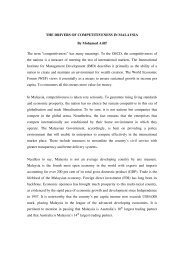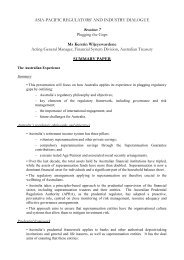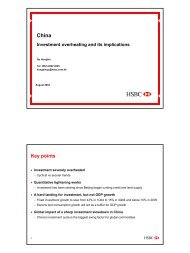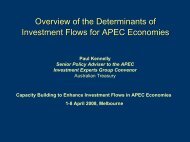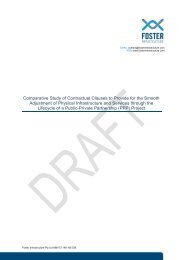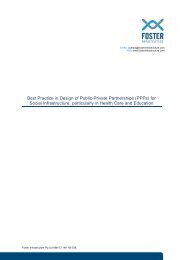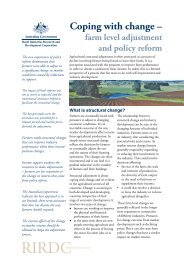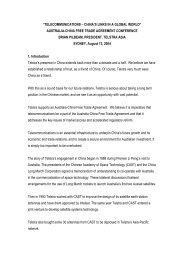Comparative Study of Contractual Clauses to Provide for the Smooth ...
Comparative Study of Contractual Clauses to Provide for the Smooth ...
Comparative Study of Contractual Clauses to Provide for the Smooth ...
- No tags were found...
Create successful ePaper yourself
Turn your PDF publications into a flip-book with our unique Google optimized e-Paper software.
<strong>Comparative</strong> <strong>Study</strong> <strong>of</strong> <strong>Contractual</strong> <strong>Clauses</strong> <strong>for</strong> <strong>the</strong> <strong>Smooth</strong> Adjustment <strong>of</strong>Physical Infrastructure and Services through <strong>the</strong> Lifecycle <strong>of</strong> a PPP ProjectAugust 2012As noted in section 3 <strong>of</strong> this report, <strong>the</strong> need <strong>for</strong> variations is generally greater in socialinfrastructure projects than in economic infrastructure projects. This provides one indicationas <strong>to</strong> why <strong>the</strong> NHAI Toll Road Contract and <strong>the</strong> NHAI Annuity Road Contract place morerestrictive limits on <strong>the</strong> size and nature <strong>of</strong> variations that government can require compared<strong>to</strong> <strong>the</strong> Australian Social Infrastructure Principles, <strong>the</strong> UK SOPC 4 and <strong>the</strong> South AfricanStandardised PPP Provisions.The Australian Economic Infrastructure Principles adopt a very different approach <strong>to</strong> <strong>the</strong>NHAI Toll Road Contract, despite both <strong>the</strong>se frameworks having specific application <strong>to</strong> <strong>to</strong>llroad projects. The difference may be due <strong>to</strong> differences in <strong>the</strong> use <strong>of</strong> <strong>the</strong> <strong>to</strong>ll road PPPmodel in <strong>the</strong>se countries. PPP <strong>to</strong>ll roads in Australia have been concentrated in urban areas,where <strong>the</strong>y <strong>for</strong>m parts <strong>of</strong> metropolitan mo<strong>to</strong>rway networks. In contrast, India's nationalhighway network links <strong>the</strong> individual urban areas across <strong>the</strong> country. It is possible that <strong>the</strong>need <strong>for</strong> variations is greater in Australia's metropolitan mo<strong>to</strong>rway networks, compared <strong>to</strong>India's national highway network.In summary, <strong>the</strong> limits on <strong>the</strong> size or nature <strong>of</strong> variations that government can require under<strong>the</strong> selected PPP frameworks reflect <strong>the</strong> following principles:1. The need <strong>for</strong> government <strong>to</strong> have flexibility <strong>to</strong> request variations over <strong>the</strong> life <strong>of</strong> aPPP project can depend upon <strong>the</strong> nature <strong>of</strong> <strong>the</strong> project, and is generally greater insocial infrastructure projects than in economic infrastructure projects.2. The need <strong>for</strong> government <strong>to</strong> have flexibility <strong>to</strong> request variations can depend upon<strong>the</strong> setting in which <strong>the</strong> project is undertaken. For example, <strong>to</strong>ll roads in metropolitanareas may require more frequent and more significant variations as <strong>the</strong> surroundingroad network develops, compared <strong>to</strong> national highways.4.1.4 Ensuring that variation costs represent value <strong>for</strong> moneyIt is good practice <strong>for</strong> government <strong>to</strong> require that any procurement be undertaken throughprocesses that ensure value <strong>for</strong> money is received and <strong>the</strong> outcome is transparent. Whereprocurement takes <strong>the</strong> <strong>for</strong>m <strong>of</strong> a variation under a PPP contract, it is <strong>of</strong>ten not possible ornot appropriate <strong>to</strong> apply government’s more general procurement processes. Never<strong>the</strong>less,<strong>the</strong> variation process under <strong>the</strong> PPP contract should enable government <strong>to</strong> satisfy itself that<strong>the</strong> variation costs represent value <strong>for</strong> money.Government’s general procurement requirements in many jurisdictions vary depending upon<strong>the</strong> cost <strong>of</strong> <strong>the</strong> goods or services being procured. For example, if <strong>the</strong> costs exceed aparticular threshold, a public tender process may be required. For lower cost procurements,a public tender process may not be required, but o<strong>the</strong>r measures will be used <strong>to</strong> ensure thatgovernment receives value <strong>for</strong> money.Some PPP Frameworks also recognise that less complex processes may be appropriate <strong>for</strong>low-cost variations. In <strong>the</strong>se Frameworks, minor works variations can be implementedoutside <strong>of</strong> <strong>the</strong> general variation process. Minor works variations are discussed in more detailin section 4.1.6.For variations o<strong>the</strong>r than minor works variations, a variety <strong>of</strong> approaches are adopted <strong>to</strong>ensure that <strong>the</strong> variation costs represent value <strong>for</strong> money <strong>for</strong> government. Table 4 onpage 17 summarises <strong>the</strong> approaches under each <strong>of</strong> <strong>the</strong> PPP Frameworks.Page 16 <strong>of</strong> 35Foster Infrastructure




